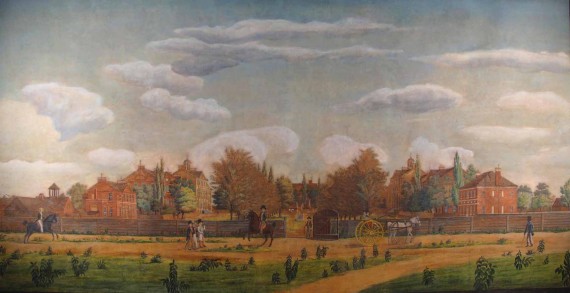When I moved to Wilmington, North Carolina as a retiree over twenty years ago, I brought much of the Yankee historical baggage—as written by the victors—of the War Between the States, or Lincoln’s War as many Southerners know it.
I’ve always been interested in history, so naturally I wanted to understand more about the Southern views of the war. I had studied battleground strategies and visited Maryland, Virginia and Pennsylvania sites, especially Gettysburg, many times. I’ve had a deep epiphanic feeling every time I go there: a sudden manifestation of the essence of the meaning of that terrible time. Yet, I never really thought about the totality of it—especially the horror and sacrifice endured by the Southern people; both military and civilian.
My great-grand uncle, Reuben Ruch, a Pennsylvania farm boy, fought at Gettysburg with the Eleventh Corp of the Union Army. He was wounded twice the first day of that battle on July 1, 1863 (probably by bullets from North Carolina troops). For many years I researched his unit, the 153rd Pennsylvania Volunteer Infantry Regiment, and planned to write an historical novel about the experiences of these young men—after writing a few chapters I stalled on that project.
The more I learn about the unnecessary tragedy of that war, the more it haunts me; until it’s too painful to write about. Now all that work lays in books, papers and manuscripts in a closet in my den.
About ten years ago I made the acquaintance of, ironically, a fellow former New Yorker who works intensely and tirelessly as an independent historian concentrating on North Carolina. He focuses on the historical records of North Carolinians who agreed to secede from the Union government, fought to preserve their independence from a tyrannical central authority and endured the injustices of the aftermath of Lincoln’s war against them.
Formerly of Western New York State, Bernhard Thuersam served recently as Chairman of the North Carolina War Between the States Sesquicentennial Commission (www.ncwbts150.com) and now edits a website called, “The Great American Political Divide” (www.circa1865.com). He lectures diverse groups throughout the Carolinas on topics related to the War and regularly conducts tours of “Confederate Wilmington”—walking tours that enlighten visitors on Wilmington’s involvement in the War Between the States, as well as trips to nearby Confederate sites. Mr. Thuersam has also organized and participated in “living history” reenactments portraying Lieutenant- General William J. Hardee who fought enemy forces in North Carolina at Averasboro and Bentonville in March 1865.
Thuersam devotes his time and personal resources to these efforts not for money or glory, but because he believes passionately in informing Americans about Southern heritage to help counter the misleading, maligning and malicious beliefs about Southerners and their fight for independence. His writings appear regularly on the Abbeville Institute’s website (www.abbevilleinstitute.org). Here is an example of one of his recent essays.
Through Mr. Thuersam and his sources I’ve discovered amazing records of historical facts and perspectives previously unknown to me—many from respected scholars and authors such as: Dr. Clyde N. Wilson, professor emeritus of history at the University of South Carolina (a native North Carolinian); Dr. Thomas DiLorenzo, economist and historian at Loyola University; Prof. Donald Livingston, Emory University; Marshall DeRosa, Florida Atlantic University.; Prof. Brion McClanahan; Prof. Carey Roberts; John V. Denson, Auburn University.; Dr. Thomas Fleming; and Charles Adams, to name of few.
During my studies of history here in North Carolina, I’ve also been surprised and saddened by the denial of some native Southerners of their ancestors’ symbol of honor and courage to stand against what they considered tyranny. Recently, here in North and South Carolina these people vigorously argued to purge the Confederate flag from public places to placate a small group of vengeful political activists who, after 150 years, decided this symbol of Southern heritage offended them.
Not surprising, the deniers of their history were politicians and political operatives trembling with fear that they would be accused of racism if they didn’t repudiate the Confederate battle flag.
I’ve also noticed that institutional, especially State-employed, historians hide from the realities of Confederate history and promote politically corrected versions of it. Worse, they willingly join radical activists—including college students ignorant of Southern history—to purge historic symbols and promote a Northern rather than the Southern perspective (e.g. a Union army of liberation rather than invaders and enemies of the Southern States).
Political historians, also known as “professional historians,” distort Southern history by ignoring key facts and circumstances, emphasizing slavery while failing to relate the war to more important causal factors, and promoting the false notion that only Southerners were racists. Most egregious, they don’t acknowledge the military crimes against Southern civilians, the deliberate destruction of the Southern economy, and the vindictive corruption of the “Reconstruction” period.
It’s sad to note that some North Carolinians deny their ancestors for fear of being accused of something they had nothing to do with. By hiding from their heritage they deprive all of us of the complete—vivid and torn—tapestry of Southern culture, so important in American history.







